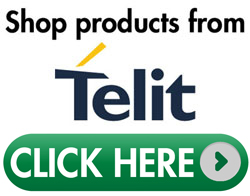- Home
- Symmetry Blog
- From Telit: "How Dead Reckoning GPS Modules are Revolutionizing Asset Tracking"
From Telit: "How Dead Reckoning GPS Modules are Revolutionizing Asset Tracking"
About Steve Feeko
Improving asset tracking through new technology is essential to operating a business in today’s global market. Scanning barcodes, utilizing RFID and BLE location broadcasting, or using high accuracy GPS tags allows business owners and managers to track the location of their inventory. But what happens when satellite coverage is obscured by travel underground and through tunnels where satellites can’t follow?
Smart dead reckoning modules relieve the problem of unreliable navigation by linking navigation systems to other data measuring devices. This could revolutionize asset tracking and how we measure data going forward.
With the Internet of Things (IoT), which is expected to connect more than 20 billion devices to physical objects by 2020, businesses will be able to do more than just track their “things.” By connecting their devices with inexpensive dead-reckoning IoT modules, businesses are able to store data on route trends to save time, remotely monitor the health of goods and livestock, replenish supplies automatically, and much more.
What is a Dead Reckoning GPS Asset Tracking Module?
Dead reckoning modules are designed to boost accuracy in areas where standard GPS/GNSS satellites might not be able to reach. To do so, they calculate a device’s future position by extrapolating information about past positions, travel speed, and intended goals. This means dead reckoning software can cover for signal gaps and allow for asset tracking in urban canyons, tunnels, parking garages, and occluded environments.
Even the smallest IoT GNSS modules work alongside GPS, Glonass, Beidou and Galileo for total reliability and the ability to pinpoint the movement of connected devices down to the millimeter.
The Automotive Industry | The Number 1 Dead Reckoning Beneficiary
Currently, the automotive industry is the largest utilizer of dead-reckoning GPS modules. When a satellite system fails, automotive dead reckoning (ADR) modules like the SL869-ADR intelligently measure data transmitted alongside the odometer, giving accurate position and velocity estimates without missing a beat.
For the automotive industry, the benefits of a dead reckoning system are clear:
- Collaborative satellite communication for better accuracy and precision
- No more dead signals when travelling into parking garages and tunnels
- Less confusion on highways with multiple lanes, overpasses, and bridges
- Depth perception to determine vertical positioning in tall structures
- Less time wasted on faulty navigation and fuel
- Avoiding traffic jams
- More accurate arrival times for commuters
- Telematics improvement through secured goods and passengers
- Improved emergency vehicle response times
- Better map matching across blocked signal locations
Other industries are quickly seeing the benefits of dead reckoning smart sensors as well. Smaller devices, more streamlined energy usage, and rapidly declining module prices all guarantee that organizations across industries will find uses for dead reckoning IoT modules beyond just asset tracking.
IoT Dead Reckoning Benefits and Solutions for Asset Tracking
Dead reckoning amplifies the strengths of IoT asset tracking by providing positional information even when GPS/GNSS signals are weak or non-existent. In turn, remote asset tracking reduces risk, saves money, and creates new revenue streams for any industry. From logistics, to perishables, to loss prevention, collecting and analyzing data saves businesses money at every touchpoint. IoT asset tracking lets businesses monitor speed, temperature, and moisture as well as location.
IoT asset tracking through dead reckoning revolutionizes how businesses can save more on their bottom line through improved prevention and recovery solutions, real-time location management, precision pinpointing, and new opportunities stemming from better time allocation.
These industries are already seeing benefits from improved asset tracking:
Transportation/Fleet Management
Asset tracking in the transportation industry means parts, vehicles and supplies don’t get lost in large operations. Dead reckoning improves asset tracking across automotive navigation, air navigation, or marine navigation.
Rain, snow, sand, waterways and dense landscapes alike can be huge problems for satellite signal strength and positioning. A recent IoT module, Telit’s Picotrack IP69K, has shown the technology’s ability to improve the security and visibility of the transfer of valuable assets in harsh conditions. German telematics device manufacturer Telic GmbH recently utilized this dead reckoning module to combat an increase in log theft, an asset loss that cost them hundreds of thousands of Euros.
Healthcare
Smart monitoring means assets don’t just get location tracking; they can also be scanned for things like temperature. IoT modules are already playing a significant role in the healthcare industry where shipping and receiving temperature-controlled pharmaceuticals and organs are a vital part of daily operations.
A smart cold chain and condition monitoring solutions can reduce wasted and damaged food and drugs. Emergency vehicles can reach their destinations more easily and accurately, avoid gridlocked traffic, and relay critical information through dead reckoning’s combined use of modules and navigation satellites.
Agriculture
Real-time alerts allow farmers to revolutionize their approach to crop and livestock management. Data-driven solutions through IoT modules mean farmers can gather data on soil, moisture levels, and weather conditions to help them plan ahead. Besides environmental condition monitoring, asset tracking modules support livestock health in terms of heart rate, blood pressure, reproductive cycles, temperature, and digestion.
Dead reckoning technology gives farmers the tools to improve the health of their assets, as well as their customers and ROI. Imagine never losing livestock that have wandered “off the grid.” Smart sensors keep animals safe and protected, no matter where they are or how fast they are moving.
Insurance
Car insurance companies can utilize asset tracking technology to monitor driving habits, store data, and score drivers to reward behavior. This data is a cornerstone of the growing practice of Usage Based Insurance (UBI). Early adopter Jooycar utilizes IoT modules for immediate accident response, driver risk calculations, roadside assistance estimation, and more.
Data gaps with faulty navigation and uncharted areas are a thing of the past with dead reckoning modules. Expect better, more accurate results, even in signal-losing parking garages where many accidents happen. Insurance companies can get the crucial data they need in real-time without fear of inaccuracy.
Achieve Asset Tracking Success with Telit
Want to find out how your business can benefit from the unique advantage of dead reckoning GNSS modules? We’d be happy to help. As a global pioneer in the IoT industry, Telit offers a wide portfolio of GNSS modules that you can connect to and manage through a single web-based IoT portal. Our GNSS modules are the simplest, most cost-effective way to implement location positioning technology for your project in a matter of days.


